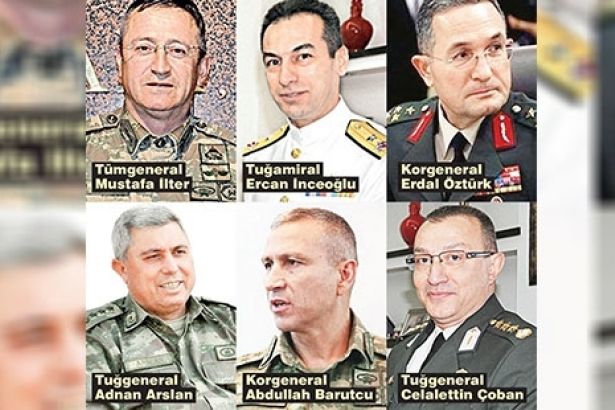Turkey's court releases 18 generals in coup attempt case

18 generals among these arrestees are released on January 9 for lack of evidence against them. Following the failed coup attempt on 15 July 2016 in Turkey, they had been arrested on charges of being named as "the commanders of the planned martial law" in the assignment list of the coup plotter generals.
Generals of the Turkish Armed Forces Erdal Öztürk, Veli Yıldırım, Şener Yazıcıoğlu, Ömer Mesut Ak, Ali Akyürek, Murat Yaygın, Celalettin Çoban, Ercan İnceoğlu, Abdullah Barutcu, Ersin Yıldırım, İsmet Gökhan Gülmez, Adnan Arslan, Salih Sevil, Osman Nadir, Ersal Ölmez, Mustafa İlter, Abdullah Baysar and Mesut Savaş are released.
THE HERO OF THE COUP ATTEMPT SURRENDERED AS A FETÖ MEMBER
As the generals accused of being among the main cadre of the coup attempt are being released, an army officer medalled for standing against the coup plotters turns himself out as a member of Gülen network, or Fethullahist Terrorist Organisation (FETÖ). FETÖ was one of the masterminds of the failed coup attempt.
Captain Burak Akın widely believed to have been behind the coup attempt, was released under judicial control conditions with a ban on leaving the country on Jan. 9.
It is alleged that Akın had heard about an investigation about him and surrendered to become a confessor to avoid punishment.
Akın had received a medal of heroism in 2016 for "resisting against the putschists", being shot at his legs on the night of the coup attempt. Akın had been accompanying Yaşar Güler, the then commander of the Turkish land forces, as his guard officer that night.
Some other arrestees of the coup attempt have also recently been released when it was evidenced that the ByLock software used by the Fethullahist Terrorist Organization (FETÖ) members for encrypted messaging had been automatically installed to the mobile phones without the knowledge of their users. FETÖ, named after the US-based Islamic preacher Fethullah Gülen, is the terrorist organization behind the failed coup attempt.



